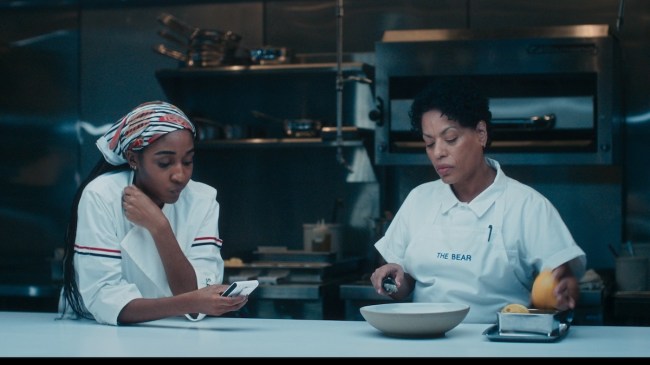“Here’s one way to look at it: It’s really fun.”
So says a best-left-unnamed guest star in a best-left-unidentified episode of “The Bear” Season 4, by way of describing time spent with the Berzatto family. And really, our mystery speaker is right. For all the grief given to Christopher Storer and Joanna Calo’s FX restaurant drama after its down year — a succinct and undeniable description that would still spark at least two separate social media feuds (one for calling it a “drama,” of course, and the other for saying it’s an FX series even though it’s only available on Hulu — have fun hashing that out, TV nerds) — the third season was still just a bit disappointing, not an outright disaster. The second season remains a triumph, and the first season, well, without it, we wouldn’t be here, now would we?
To some sickos out there — the quoted speaker very much included — all of this, everything from fighting over how many awards “The Bear” should win to celebrating the highs and lows of each season, could be looked at as “fun.” The show itself, while not firstly “funny,” is also often fun. At its core, “The Bear” is an underdog story about a ragtag group of restaurant workers who all want to be better at their jobs so they can also be better at their lives. They follow their passions. They level up slowly but deliberately. They share in their victories and their defeats. They’re a team, or a family, that’s easy to root for.
And they’re also, quite often, a very loud mess. The unspoken implication of our unnamed character above — OK, enough is enough: It’s Stevie, aka John Mulaney — is that while hanging out with the Berzattos can be fun, it can also be intense and upsetting. As evidenced by the panicked, frenzied, lighting-your-clothes-on-fire nature of Season 1, Carmy (Jeremy Allen White) and his family have a lot of issues to work out, some of which are rooted in personal loss and mental illness, some of which are rooted in cooking culture and capitalism, and some of which spring forth from the potent combination of all the above.
Looking back, Season 2 may have been the series’ high point in part because it marked the exact juncture in the narrative when The Beef became The Bear; when the Berzattos (et al.) tore down their damaged past to try to build something new and pristine; when their established brand of chaos first had to be reined in, not only for their own individual sanity but for the betterment of their collaborative creation. The clash between old and new, between their inherited insanity and their push for newfound serenity, stirred up strong drama, balancing a dark-and-stormy kitchen with bursts of blessed light.
Now, entering the back half of a 20-episode arc split into two seasons (😬), “The Bear” isn’t as severe as it used to be, but it isn’t as propulsive either. Season 4 too often embodies its lead character in that it doesn’t know what to do when it’s not enmeshed in mayhem. By now, Carmy can recognize the chaos in his kitchen is bad — a symptom of obsessive, oppressive head chefs (and his own explosive family life) that he now can’t help but inflict on his team — but chaos is also a requisite when running a restaurant. Thus, our lonely boy chef is left in limbo: With a lot of help from Sydney (Ayo Edebiri), he might be able to find harmony in the kitchen, but can he ever find it at The Bear? Or any kitchen?
It’s a fair question, but one the series only approaches in fits and starts. Season 4 thrives in almost all the expected places: The cast remains exceptional, with showcase scenes for Edebiri, Jamie Lee Curtis (as Carmy’s volatile mom, Donna), and Molly Gordon (playing Carmy’s dream girl, Claire). Oliver Platt and Bob Odenkirk are quietly triumphant, lending gravitas to sneaky-serious conversations that feel all the more potent for being treated like a common occurrence, and the surprise A-list guests are wisely limited to a few (gratifying) new stars. (The Faks also see their presence curtailed, after going a bit overboard with Season 3’s comic relief, while Edwin Lee Gibson’s Ebraheim gets his richest material to date — and makes the most of it.)

A few smart decisions pay off without reaching their full potential. Exciting additions in the premiere go underdeveloped. Returning favorites bring sudden sparks without standing to reason. A few weepy monologues tie up loose ends, even if they’re a little too loose with their language to hit as hard as they should. As often happens with someone, supporting characters aren’t given enough to do, and this year Tina (Liza Colón-Zayas) gets a particularly stilted arc, while Marcus’ clear progression is mired by a bland build-up.
Still, these are forgivable flaws when surrounded by so much that’s easy to enjoy, and “The Bear” is often easy to enjoy. (Lest we forget, it’s the rare half-hour drama, even if episodes do regularly run five minutes long.) Where Season 4 noticeably falters is, oddly enough, where past seasons thrive. Later in the season, there’s an inverse vision of the acclaimed, all-hands episode “Fishes,” which is lovely, but the other attempt at a departure episode falls uncharacteristically flat. “Sydney’s day off” sounds like an appealing enough premise (and leaving her to explore Chicago in “Sundae” worked out great), but Season 4’s version spends far too long on a single choice — the same choice Sydney struggles with for most of the season, and a choice with an answer that’s all too obvious for quite some time.
Carmy, once again, suffers a similar fate. While Season 1 asked whether he could keep his late brother’s greasy spoon afloat and Season 2 questioned whether he could turn it into a fine-dining destination, Seasons 3 and 4 are built around whether The Bear is actually a sustainable business and lifestyle. The latter weighs more heavily on Carmy, given his recent tantalizing experiments in joyful wandering (mainly with Claire, mainly by not working), and Season 4 sees him creep toward a foreseeable decision that’s nevertheless saved for the finale (and treated like a twist).
His intermittent dilly-dallying doesn’t always feel egregious. There are big emotional talks that need to be had, and there’s a literal ticking clock on his restaurant’s solvency, which add dramatic heft and a dash of that old urgency, respectively, to Carmy’s 10-episode deliberation. But despite making a definitive choice, Season 4’s ending still feels like kicking the can down the road. There’s no “to be continued” after Episode 10, like there was last season, but too many storylines meant to be resolved are left dangling, and the finale itself is too constricted by its design to convey what little closure it does offer. The ending saps so much momentum, it makes you wonder if this was once meant to be the series finale, despite the lingering prevalence of those unanswered questions.
Seen one way, “The Bear” Season 4 is still pretty fun; an emotionally rich restaurant drama with great food, a few laughs, and lots of heart. Seen another way, though, and it’s our second straight disappointment; a prolonged story propped up by its talented cast and dragged out for reasons that remain unclear. Revisiting “The Bear” will likely always leave you nourished. But it’s drifting further away from a Michelin-level hang.
Grade: B-
“The Bear” Season 4 premieres Thursday, June 26 on Hulu. All 10 episodes will be released at once.
